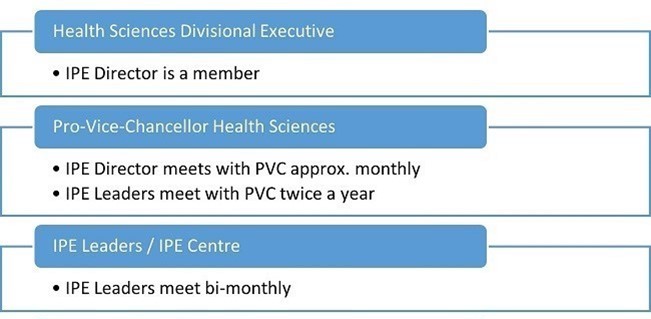
IPE strategy
The Division of Health Sciences has a vision to "establish Otago as a national leader in interprofessional education across the health professions."
To achieve that vision, the
From 2020, the Division moved into a second cycle of strategic goals, set out in:
Specifically, these are policy recommendations for Otago, to support a high-quality, integrated and longitudinal
- Overarching aims for
IPE - Common
IPE language - Variable
IPE activity components in a sequential curriculum - Defined set of curriculum learning outcomes
- Expectations for student attainment, collectively and individually
- Guidelines for
IPE student assessment andIPE activity evaluation - Capacity to adapt and respond to the context, needs, opportunities and partnerships of
IPE - Recognition for staff contribution to
IPE teaching - Quality systems to accredit
IPE activities, record studentIPE credits, and evaluate theIPE integrated curriculum.
IPE Centre
The Division of Health Sciences Centre for Interprofessional Education ("
IPE DirectorIPE Deputy DirectorIPE Campus Leads:IPE Leads DunedinIPE Lead UOCIPE Lead UOW
- IPE Centre Manager
- IPE Programme Leaders, Deputy Programme Leaders, and Professional Practice Fellows, for Complex Rural Immersion Sites
- IPE Complex Rural Immersion Programmes Manager and Lead Administrator
- Administrators Client Services and Kaiwhakahaere Tari
- IPE Research Fellow
With oversight by the Divisional Executive, the Centre sets a direction and work programme to support and foster the development of high-quality
Contact details for the
Progress and timeline towards strategic objectives
2023 focus
- Maintain all learning activities that are going well and can be delivered under current health system pressures.
- Continue to monitor gaps or over-supply in learning activities that are designed to deliver particular competencies and begin the work of addressing these.
- Liaise with all Otago health professional programmes to ensure IPE is included in curriculum review, e.g. Future of Advanced Learning in Medicine.
- Prioritise development of new IPE learning activities in clinical workplaces; experience has shown this requires significant practical support from IPE Leaders and IPE administrators as well as specific modest funding of Te Whatu Ora staff for IPE teaching roles.
- Welcome offers by other Departments, Schools and partners to independently offer or partner in leading IPE activities, e.g. as proved successful in 2022 for IPE Professional Ethics development (Bioethics) and IPE Cancer Care and Life-limiting Illness in Midcentral (partnering with staff from Massey University).
- Sustain IPE research at current levels.
IPE governance and linkages

- The IPE Director is a member of the Health Sciences Divisional Executive, facilitating Divisional strategic oversight of the
IPE Centre and the Health Sciences Division'sIPE activities. (Prior to 2021, a Divisional IPE Governance Group (DIPEGG) served this function.) - The
IPE Leaders Group - comprising theIPE Director,IPE Divisional Lead,IPE Campus Leads,IPE Centre Manager, Complex Rural Immersion Programme Leaders and Manager - provides leadership and strategic support toIPE Campus Groups as required. IPE Campus Groups and/or task teams serve asIPE leadership teams on each campus (Dunedin, UOC, UOW).- Executive Operations Groups oversee complex rural immersion programmes.
- The
IPE Centre and its divisional and campus-level governance structures - The
IPE Centre andIPE activities and teams based at various campus and regional sites, as well as complex rural immersion activities, i.e. the Tairāwhiti Interprofessional Education Programme and Te Tai Poutini IPE Programmes IPE activities involving the University of Otago and other community and institutional partners.
